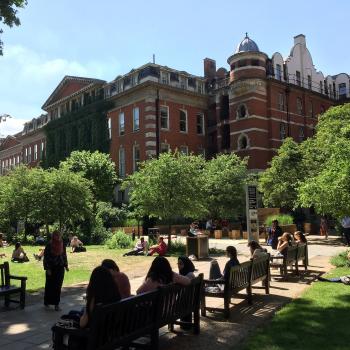
(Wikimedia Commons public domain image)
Last night, my wife and I attended a screening in one of our local theaters of the film After Death. , which, by the way, is distributed by Angel Studies, the Utah Valley operation that also distributes The Chosen and Sound of Freedom. I commend After Death to you. It introduces and features some of the standard names in the study of near-death experiences (e.g., Dr. George Ritchie, Dr. Kenneth Ring, John Burke, Dr. Jeffrey Long, Don Piper, Captain Dale Black, Dr. Raymond Moody, Howard Storm, Dr. Michael Sabom, Dr. Mary Neal, Pam Reynolds, Dr. Bruce Greyson, and so forth) and it covers many of the major points in the field.
I have to admit, though, that I was slightly disappointed by the film. (Had I been responsible for it, in other words, I would have made it somewhat differently.) For one thing, its pacing was a bit slow. For another, I disliked its color palette, which seemed to me too dark, and its “emotional palette,” which fit the color palette in that it was oddly joyless. (At one point in recounting Howard Storm’s story, it has him leaving behind his hospital room, which he describes as brightly lit, to enter into the relatively dim and gray hospital hallway. In fact, though, in the film’s depiction the hospital room is substantially darker than the hallway.) I also would have preferred it to have more fully told the stories of the “experiencers” that it references.
That said, though, I don’t want to discourage you from seeing After Death. Quite the contrary. This is an enormously important subject; if even one of the many thousands of reported near-death experiences is true, then — or so it seems to me — atheistic materialism is almost certainly false. And, anyway, all of us are inevitably going to die. We ought to be interested in the question of what, if anything, happens after that. And here is what purports to be empirical evidence toward answering that question.

(Wikimedia Commons public domain image)
Like many of you, I’m appalled by the news coming out of Israel and Gaza. Of course, I understand the Israelis’ desire to destroy Hamas, which has never acknowledged Israel’s right to exist and which has spent years not only misruling and oppressing Gaza but attempting, to the extent that it has been able, to foment terror within Israel and to murder Jews.
That said, I’m horrified at the death toll coming out of the civilian population of Gaza, and hope that it can be modified.
As an Arabist — but not only for that reason — I have considerable sympathy for Palestinian grievances, which are real, legitimate, and considerable. I have never been able, however, to sign on uncritically for the Palestinian cause, which has refused for many years to seek and maintain the moral high ground. I’ve been specifically disturbed by many of the voices in current pro-Palestinian demonstrations, which seek to portray the recent horrors there in the region as solely the responsibility of the Israelis. It seems obvious to me that a refusal to acknowledge the crimes committed by Hamas on 7 October — specifically, the deliberate and brutal targeting for murder of unarmed civilians, including women, children, and the elderly — indicates a lack of moral seriousness. It is one thing to lament and oppose the lethal bombing and violent invasion, by Israel, of civilian areas, but quite another to do so while refusing to acknowledge the gross offenses committed by Hamas.
Right now, I’m very concerned lest Hezbollah, up in Lebanon, launch an attack on Israel from the north, and I really hope that the West Bank remains relatively calm. I feel for friends on both sides. The overwhelming majority of those on both sides don’t deserve this kind of suffering. And I feel very specifically for the guides and shopkeepers that we know, almost all of them Palestinians, who had already suffered through the dearth of tourism that was caused by the COVID-19 pandemic and who now may face yet another indeterminate period without income. One of our Palestinian guides has told us of the depression that he faced during the pandemic, which actually made him — ordinarily, as we know from many years of acquaintance with him, a jovial person, seriously contemplate suicide.
None of this is necessary. None of it really helps anybody, except perhaps a few firebrands and zealots, who feed on and advance their careers through crises, war, bloodshed, and agitation. I’m continually reminded of what I regard as one of the greatest passages in all of scripture:
And it came to pass that the God of heaven looked upon the residue of the people, and he wept; and Enoch bore record of it, saying: How is it that the heavens weep, and shed forth their tears as the rain upon the mountains?
And Enoch said unto the Lord: How is it that thou canst weep, seeing thou art holy, and from all eternity to all eternity?
And were it possible that man could number the particles of the earth, yea, millions of earths like this, it would not be a beginning to the number of thy creations; and thy curtains are stretched out still; and yet thou art there, and thy bosom is there; and also thou art just; thou art merciful and kind forever; and thou hast taken Zion to thine own bosom, from all thy creations, from all eternity to all eternity; and naught but peace, justice, and truth is the habitation of thy throne; and mercy shall go before thy face and have no end; how is it thou canst weep?
The Lord said unto Enoch: Behold these thy brethren; they are the workmanship of mine own hands, and I gave unto them their knowledge, in the day I created them; and in the Garden of Eden, gave I unto man his agency; and unto thy brethren have I said, and also given commandment, that they should love one another, and that they should choose me, their Father; but behold, they are without affection, and they hate their own blood. (Moses 7:28-33)
I’ve also been thinking of Doctrine and Covenants 98, which reminds us that “when the wicked rule the people mourn” (verse 9) and advises us to “renounce war and proclaim peace” (verse 16), and of the beatitude that says “blessed are the peacemakers, for they shall be called the children of God” (Matthew 5:9; 3 Nephi 12:9).
Peace seems such an obvious good. But how to achieve it?













